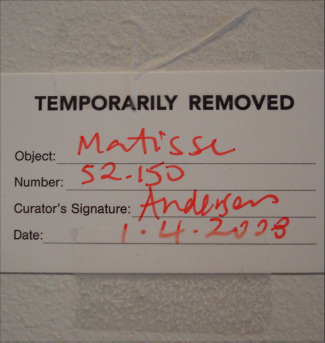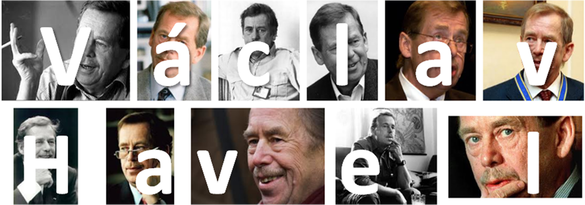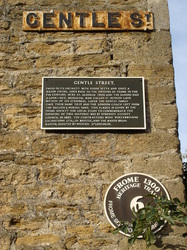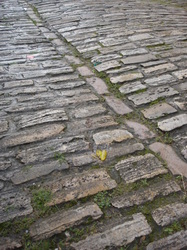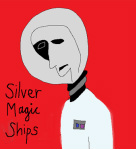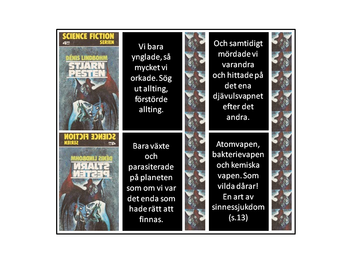 _ Bayou Arcana is the title of a graphic novel anthology illustrated entirely by female artists. Its imminent release has prompted The Guardian to declare that "a new generation of female artists and readers is radically changing the face of comics."(1) In support of this claim they cite last month's Thought Bubble festival. This six-day event featured the Comics Forum 2011, at which I gave a talk on the Estonian artist, Kristina Norman "from a Dreddful perspective". Lisa Wood, co-founder of Thought Bubble, told The Guardian that the prevailing "comic book culture" tends to leave "many female comic book fans... [feeling] ignored, harassed, or treated with hostility".(2) This struck a chord with me given that I'm currently reading the science fiction novel Stjärnpesten (The Star Plague) written in 1975 by the Swedish writer, Dénis Lindbohm.(3) I have reached page 87, just as "the gates of hell" are about to open. The story so far concerns an as-yet-unidentified entity that has wiped out life on earth. Seemingly the only survivors are a 20,000 strong community that managed to build a hermetically sealed underground city before the "plague" struck. Unfortunately, this band of plucky survivors has swiftly descended into internecine conflicts and is languishing in the subterranean equivalent of George Orwell's 1984. Whilst I am thoroughly enjoying this dystopian distraction, it is striking that every single one of the protagonists so far has been male. The first challenge to this crops up on page 41 in the form of an unnamed female's corpse (p.41). Fifteen pages later appears an unidentified woman who gets pregnant without permission and undergoes a brutal forced abortion. Finally, a couple of mothers, an old lady and a young girl are paraded in front of the cameras and used for propaganda purposes by the dastardly dictatorship (p.84). Fingers crossed that there are some interesting female characters behind those gates of hell... Maybe as an antidote to all this sci-fi and comic machismo I ought to follow The Guardian's advice and read Ursula K Le Guin's The Left Hand of Darkness published in 1970?(4) With luck by the time I've finished it Bayou Arcana will have been published. ____ Notes (1) Ben Quinn, "Ker-pow! Women kick back against comic-book sexism", The Guardian, 28/12/2011 accessed 29/12/2012 at, http://www.guardian.co.uk/books/2011/dec/28/women-comic-book-sexism. (2) Ibid. (3) Dénis Lindbohm, Stjärnpesten, Stockholm, Regal, 1975. (4) Justine Jordan, "Winter reads: The Left Hand of Darkness by Ursula K Le Guin", The Guardian, 27/12/2011 accessed 29/12/2012 at, www.guardian.co.uk/books/2011/dec/27/winter-reads-the-left-hand-of-darkness. __________ Supplemental 02/01/2012 But we must get the world to rot, because not until all dead organic material has decomposed can we sow the world with life anew. We must bide our time; our long period of waiting. Stjärnpesten (The Star Plague), p. 151 Well, I've now finished Dénis Lindbohm's entertaining novel. Alas, female characters didn't fare any better after page 87. The only properly identified woman was a Satanist by the name of Raader. She is allocated a single paragraph (p. 111). The narrator's meeting with "Lucifer's Alpha" wasn't terribly productive: "When I left her I wasn't any wiser than before I came." Perhaps things might have gone a tiny better for this ark of humanity if they'd opted to share power amongst both men and women? Lindbohm's novel would certainly have benefitted... 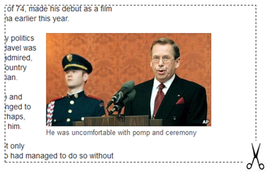 _ Today is the day of Václav Havel's funeral. To mark this occasion I have been reading his remarkable "Letter to Dr Gustáv Husák, General Secretary of the Czechoslovak Communist Party". This is dated 8th April 1975, shortly before Husák assumed the presidency of Czechoslovakia. He held this post until 1989. His successor was Václav Havel. This is a remarkable turn of events given that the Husák regime imprisoned Havel for his political beliefs. In his letter of 1975, Havel makes a number of fascinating comments about history.(1) For Havel, "true" or "real" history is chaotic. It comprises a whole series of unique, unrepeatable events. It follows, therefore, that only a truly vibrant society – "a society that is really alive" – is capable of appreciating and generating true / real history. The antithesis of this authentic history is what Havel calls "pseudo-history", the author of which is "not the life of society, but an official planner." These apparatchiks substitute "the disquieting dimension of history" with a remorseless succession of "non-events": stilted, stifling and repetitive anniversaries, celebrations, parades, congresses. These are used by governments to maintain the pretence that "history is moving". The result is that, thanks to this substitution for history, we are able to review everything that is happening in society, past and future, by simply glancing at the calendar. And the notoriously familiar character of the recurrent rituals makes such information quite as adequate as if we had been present at the events themselves. This raises a slightly tricky dilemma, however. Václav Havel is likely to be commemorated by a phalanx of "recurrent rituals", including anniversaries, celebrations and perhaps even the occasional congress or two. Maybe his birthday – 5 October – will become "Václav Havel Day". But wouldn't it be awful if this became just another "non-event" in the commemorative calendar? Surely the worst possible way of remembering Havel would be to enlist him to the cause of pseudo-history; to trap him in all the "trappings of state"?(2) With this in mind, any incipient "Václav Havel Day" must be a madcap mix of "the continuous and the changing, the regular and the random, the foreseen and the unexpected". It should be a moment of radical reflection – as much about the present and future as about the past. A true "Václav Havel Day" would be an occasion to bring our societies to account in all sorts of innovative and satirical ways. Put simply: to create true history. This would safeguard us from falling into a nostalgic yearning for a pseudo-past and succumbing to the dead hand of pseudo-history. Václav Havel is sadly no longer alive. It is up to us to ensure that he goes on living in the realm of true history. ____ Notes (1) The following quotations are derived from Václav Havel's "Letter to Dr Gustáv Husák, General Secretary of the Czechoslovak Communist Party", pp. 3-35 in Living in Truth (Jan Vladislav, ed.) (London: Faber & Faber, 1989). (2) Stuart Hughes, "Vaclav Havel funeral: World leaders pay respects", BBC News, 23/12/2011, accessed, 23/12/2011 at, http://www.bbc.co.uk/news/world-europe-16304858. 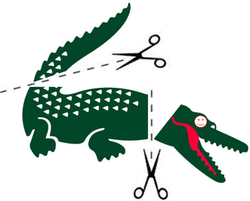 Cut Croc (or) Lacerated Lacoste __Earlier this month it was announced that a series of London-based museums would be renewing their £10m sponsorship deals with BP.(1) These initials - BP - are derived from "British Petroleum", the name the company adopted in 1954. Some people feel that it is inappropriate for institutions like Tate or the British Museum to accept money from an oil company responsible for such environmental disasters as the Sea Gem oil rig collapse (1965), the Texas City Refinery explosion (2005) and the Deepwater Horizon well explosion in the Gulf of Mexico (2010). However, as the firm is keen to stress, BP means "Beyond Petroleum". Associating itself with art and culture is therefore good for business. But is it good for society? Recipients of financial support - be it in the form of public grants or private sponsorship - need to guard against undue influence or censorship. A cautionary tale is provided by this year's Lacoste Prize at the Musée de l'Elysée in Lausanne, Switzerland. Despite claims to the contrary, it appears that pressure from the sponsor has led to the cancellation of the award.(2) This seems to have been triggered by the Jerusalem-born artist Larissa Sansour and her artwork, Nation Estate (2011-12). Inspired by Palestine's bid for nation status at the UN, Sansour has opted to imagine a dystopian vision of a future world in which the Palestinians have their state in the form of a single skyscraper: the Nation Estate. Surrounded by a concrete wall, this colossal hi-rise houses the entire Palestinian population - finally living the high life. Each city has its own floor: Jerusalem, third floor; Ramallah, fourth floor. Intercity trips previously marred by checkpoints are now made by elevator. Aiming for a sense of belonging, the lobby of each floor re-enacts iconic squares and landmarks - elevator doors on the Jerusalem floor opening onto a full-scale Dome of the Rock. Built outside the actual city of Jerusalem, the building also has views of the original golden dome from the top floors.(3) Executives at Lacoste felt that all this was a far cry from the competition's theme of happiness ("joie de vivre"). Lacoste's sweet little "green crocodile logo" was clearly about to lose its cheeky grin.(4) So the company sought to close the elevator doors on Larissa Sansour's Nation Estate. If this was their intention, then the opposite has transpired. I would never have heard of Larissa Sansour or her thought-provoking sci-fi skyscraper without the helpful intervention of Lacoste. So perhaps private sponsorship isn't such a bad thing after all? ____ Notes (1) Mark Brown, "Galleries renew £10m BP deal despite environmental protests", Guardian, 19/12/2012, accessed 22/12/2012 at, http://www.guardian.co.uk/culture/2011/dec/19/galleries-renew-bp-deal-protests. (2) "Lacoste Prize cancelled amid censorship row", BBC News, 22/12/2012, accessed 22/12/2012 at, http://www.bbc.co.uk/news/entertainment-arts-16299688. (3) "Nation Estate", accessed 22/12/2012 at, http://www.larissasansour.com/nation_estate.html. (4) "Lacoste logo", accessed 22/12/2012 at, http://www.famouslogos.us/lacoste-logo. 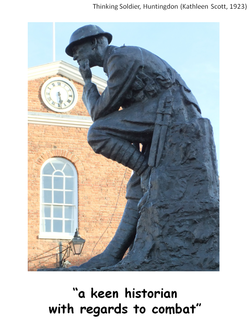 _It's a long way from Nottingham to Atlantic City in New Jersey. Carl Froch must therefore have felt particularly far from home yesterday after spending twelve gruelling rounds in the ring with the American boxer, Andre Ward. A unanimous points decision gave Ward the victory and with it Froch's WBC belt.(1) This is the 34-year-old's second defeat of his illustrious boxing career and, to quote BBC Radio Nottingham's Robin Chipperfield, "[it] is unclear where Froch goes from here."(2) Well, one place Carl Froch might go is Nottingham Trent University. He'd make a great guest speaker for my History students. At least, that is, if Wikipedia is to be believed. His encyclopedia entry contains the following memorable sentence: "Froch is an avid fan of Johnny Cash and is also a keen historian with regards to combat."(3) The Nottingham-born boxer would be able to provide an interesting confirmation of why History matters. Surely all good boxers would benefit from a degree in the subject? And, speaking more generally, "every shot fired [has] an echo".(4) This means that, in order to reach a proper understanding of any present-day conflict, we need to know our military history. So, now that his career as a fighter is drawing to an end, perhaps Carl Froch could reinvent himself as an academic historian with a sideline in the history of popular music? A good starting point for a Froch lecture would be Johnny Cash's "The Big Battle" (1962): I see sir the battle's not over; the battle has only begun [...] The battle will rage in the bosom of mother and sweetheart and wife Brother and sister and daughter will grieve for the rest of their lives [...] For though there's no sound of the cannon and though there's no smoke in the sky I'm dropping the gun and the sabre and ready for battle am I. (5) In addition, Froch's professional achievements to date would surely make him a potential candidate for an honorary degree from Nottingham Trent University? After all, he's a local lad who has made a global impact in his chosen field. One day there will be plaques indicating where he lived and sparred. Perhaps he'll even be honoured with a statue adjacent to Brian Clough in Nottingham city centre? As time passes, of course, the sportsman's name will start to become a distant memory. Which is why we need future combat historians to tell us all about Carl "The Cobra" Froch and the place he occupies in boxing history. ____ Notes (1) Anon, "Carl Froch 'bitterly disappointed' by defeat to Andre Ward", Telegraph, 18/12/2011, accessed 18/12/2011 at, http://www.telegraph.co.uk/sport/othersports/boxing/8964028/Carl-Froch-bitterly-disappointed-by-defeat-to-Andre-Ward.html. (2) Robin Chipperfield, "BBC man on Carl Froch-watch", BBC News, 18/12/2011, accessed 18/12/2011 at, http://news.bbc.co.uk/sport1/hi/boxing/16236412.stm. (3) "Carl Froch", accessed 18/12/2011 at, http://en.wikipedia.org/wiki/Carl_Froch. (4) Johnny Cash, "The Big Battle", Ring of Fire: The Best of Johnny Cash (Columbia, 1963). (5) Cf. John McCrae's famous poem In Flanders Fields (1915): Take up our quarrel with the foe: To you from failing hands we throw The torch; be yours to hold it high. If ye break faith with us who die We shall not sleep, though poppies grow In Flanders fields. __"Revolt... steps out of living within the lie... [and] is an attempt to live within the truth...
"When I speak of living within the truth, I naturally do not have in mind only products of conceptual thought, such as a protest or a letter written by a group of intellectuals. It can be any means by which a person or a group revolts against manipulation". Václav Havel (1936-2011), The Power of the Powerless, 1985 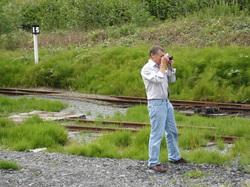 _ enthusiast, n. [http://oed.com/view/Entry/62880] 3.a. One who is full of "enthusiasm" (see enthusiasm n. 3) for a cause or principle, or who enters with enthusiasm into a pursuit. 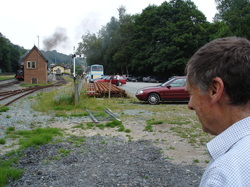 Llangollen (22/07/2006) _ enthusiasm, n. [http://oed.com/view/Entry/62879] 3.a. Rapturous intensity of feeling in favour of a person, principle, cause, etc.; passionate eagerness in any pursuit, proceeding from an intense conviction of the worthiness of the object.  MOCA 02/04/2009 An occasional series documenting the first thing one sees in your visitor-friendly museum: the "Do Not..." sign Do Not... MOCA Museum of Contemporary Art, Los Angeles _ 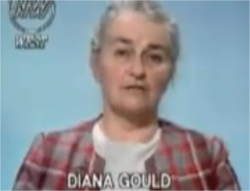 18 April 1926 - 3 December 2011 _ I am a child of Thatcher’s Britain. As such, one of my earliest political memories was a television interview between Prime Minister Margaret Thatcher and Diana Gould, a teacher from Gloucestershire. The exchange concerned the highly controversial sinking of the ship, General Belgrano. This occurred during the war between Great Britain and Argentina regarding the sovereignty of the Falkland Islands (Islas Malvinas). Transcripts of the interview are available online, as is the actual television footage.(1) Gould was motivated by a belief that the Belgrano had been in international waters and on a bearing that took it away from the Falklands at the time it was torpedoed by the British submarine, Conqueror with the loss of 323 lives. She felt, moreover, that this action occurred at a time when a peaceful resolution of the conflict was still possible. Gould presented these arguments in a lucid, forceful manner which clearly rattled Thatcher.(2) Diana Gould died a few days ago at the age of 85. Whatever one’s politics, she deserves to be remembered for the courage she demonstrated in standing up to the Iron Lady. I find this as inspirational today as I did as a ten year old schoolboy. We need more Diana Goulds: everyday heroes and heroines who refuse to be cowed into silence by overbearing politicians and gutter-snipe journalists. And remembering Diana Gould obliges us to recall the jingoism of the Falklands campaign. This was encapsulated in a single word: "Gotcha!"(3) That was the infamous headline used by The Sun newspaper on 4th May 1982 to announce the sinking of the Belgrano. Dennis Potter's characterisation of Rupert Murdoch as a cancer in British society finds irrefutable proof in those six letters.(4) Let us hope that future generations opt to celebrate the humble heroism of Diana Gould (1926-2011) rather than choosing to wallow in the belligerence of Margaret Thatcher and the malevolence of Rupert Murdoch. ____ Notes (1) See, for example, "Diana Gould", accessed 09/12/2011 at, http://en.wikiquote.org/wiki/Diana_Gould. (2) "Diana Gould" (obituary), The Telegraph, 09/12/2011, accessed 09/12/2011 at, http://www.telegraph.co.uk/news/obituaries/8944544/Diana-Gould.html. (3) Roy Greenslade, "A new Britain, a new kind of newspaper", The Guardian, 25/02/2002, accessed 09/12/2011 at, http://www.guardian.co.uk/media/2002/feb/25/pressandpublishing.falklands. (4) See my first ever blog posting, "Dennis Potter and Rupert", 19/07/2011 available at, http://www.stuartburch.com/1/post/2011/07/dennis-potter-and-rupert.html. 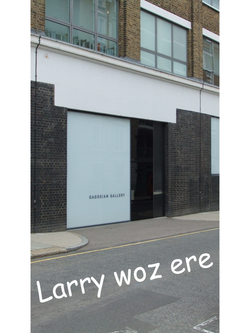 _ Miami Art Museum is about to be rechristened. This name change has been prompted by a property developer who has promised to gift the institution art and money totalling $35 million over the next ten years. In return for this generosity the museum will be renamed the Jorge M. Pérez Art Museum of Miami-Dade County. This controversial decision has prompted the resignation of three board members.(1) The feelings of these ex-members of Miami Art Museum’s board are probably as intense as those football fans of Newcastle United who are outraged by the fact that their sporting home is now no longer known as "St James' Park". It is instead "the Sports Direct Arena". This catchy moniker matches the name of the business owned by the club's chairman, Mike Ashley. There are many such examples, from Amex Stadium to KitKat Crescent.(2) But should our museums be co-opted by the egos of rich individuals and the machinations of global brands? Where might all this lead? Tate Starbucks? Courtauld Coca-Cola Institute of Art? Horniman "Happy Meal" Museum? Wallace-Wikipedia Collection? Um, on second thoughts perhaps the Jorge M. Pérez Art Museum of Miami-Dade County isn't quite as radical as it at first seems. Just ask the likes of Sir Henry Tate (1819-99), Samuel Courtauld (1876-1947), Frederick John Horniman (1835-1906) and Sir Richard Wallace (1818-90). All are museumified to such an extent that their names sound dignified and, well, museal. Who knows, the next time you visit the Duveen galleries of Tate Britain or the British Museum they might have been reborn as the Apple Ambulatory and the Google Gallery. No one remembers Sir Joseph Duveen (1869-1939) anyway... ____ Notes (1) Hannah Sampson, "Developer gives $35 million naming donation to Miami Art Museum", Miami Herald, 12/02/2011, accessed 05/12/2011 at, http://www.miamiherald.com/2011/12/02/2528192/developer-gives-35-million-naming.html. (2) David Conn, "Newcastle stadium name-change lacks class and is unworthy of history", The Guardian, 10/11/2011, accessed 05/12/2011 at, http://www.guardian.co.uk/football/blog/2011/nov/10/newcastle-united-st-james-renaming. |
Para, jämsides med.
En annan sort. Dénis Lindbohm, Bevingaren, 1980: 90 Even a parasite like me should be permitted to feed at the banquet of knowledge
I once posted comments as Bevingaren at guardian.co.uk
Archives
July 2019
Categories
All
_
Note All parasitoids are parasites, but not all parasites are parasitoids Parasitoid "A parasite that always ultimately destroys its host" (Oxford English Dictionary) I live off you
And you live off me And the whole world Lives off everybody See we gotta be exploited By somebody, by somebody, by somebody X-Ray Spex <I live off you> Germ Free Adolescents 1978 From symbiosis
to parasitism is a short step. The word is now a virus. William Burroughs
<operation rewrite> |
key words: architecture | archive | art | commemoration | design | ethics | framing | freedom of speech | heritage | heroes and villains | history | illicit trade | landscape | media | memorial | memory | museum | music | nordic | nottingham trent university | parasite | politics | science fiction | shockmolt | statue | stuart burch | tourism | words |
